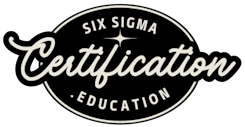SSCE – So the hospital launched the Six Sigma project during
Covid?
Aliyah – Yes, it was shortly after Covid started. They said it was important for the company to
cut costs and they were looking for ways to do that without cutting staff.
SSCE – When was the first time you heard the words Six
Sigma?
Aliyah – It wasn’t until I was signed up for a training
class by my manager. The title of the
training was “Six Sigma Yellow Belt – Subject Matter Experts”.
SSCE – What is your normal job at the hospital?
Aliyah – I work in administration. I deal with all the paperwork for
admissions. When a patient is being
admitted there is a lot of paperwork. I
coordinate rooms, verify insurance, handle transfers, stuff like that.
SSCE – What was the training like?
Aliyah – It wasn’t too bad.
Honestly it was kind of boring, haha.
I was nervous before the training because someone told me there was a lot
of math involved, but that really wasn’t the case. For the Yellow Belt role you’re really just
doing your normal job.
SSCE – So you didn’t have to do a lot of statistical
analysis or anything like that?
Aliyah – No, for me it was really just about helping my boss
streamline our job. I know my boss, who
was a Green Belt, had to do some calculations and stuff, but she did all that
in Excel so I don’t think it was too bad.
SSCE – How long did you work on the project?
Aliyah – It was only about three weeks. It consisted of a lot of meetings and
analysis of our processes. The project
coordinator wanted to see everything I did and shadowed me non-stop for three
days. Writing down all the forms I used,
the different places I traveled to in the hospital, everything.
SSCE – Sounds like it was invasive?
Aliyah – Kinda yeah, but not really. They made it very clear that they weren’t
evaluating me, but evaluating the processes that I need to follow to admit
patients and process the insurance.
SSCE – Can you give me a specific example of something you
found during the project?
Aliyah – My biggest complaint with admissions is that I
needed to go to a different department in the hospital if anything insurance-related
came up. For example, if the patient had
Medicaid and Medicare, I’d need to go to Records to help determine how the
billing would be processed. This project
really highlighted the problem. I was
wasting a lot of time going back and forth.
SSCE – Had you reported this problem in the past?
Aliyah – Yes but no one really listened. It’s just the way the process has always been
done and was considered part of the job.
SSCE – So the project validated what you had pointed out in
the past.
Aliyah – Yes, once they say how much time it wasted.
SSCE – Was this issue eventually fixed?
Aliyah – Yes, about six months later they moved the Records
department to the office next to admissions and installed a window between the
two rooms. That completely eliminated my
need to walk anywhere to do my job. They
also made some small updates to our software that improved the process. We also used 5S methods to make sure
everything is sorted in the office correctly.
SSCE – So has your job improved since the changes?
Aliyah – Very much so.
I can admit patients much faster now.
SSCE – Moving the Records office and making the software changes
must have been expensive for the hospital, do you think it was worth the
expense?
Aliyah – I would say yes.
We’re wasting less time and we’re admitting patients faster. We also accept more transfer patients from
other hospitals now and answer a lot more phone calls. I think in the long run this has made the
hospital much more efficient and profitable.
SSCE – Do you plan to take your Six Sigma Green belt
certification in the future?
Aliyah – Maybe, I really liked working on my part of the
project. I also know having the
certification could be helpful in the future if we do another Six Sigma
project, or if I switch jobs.
SSCE – Aliyah that you so much for taking about your six
sigma project experience with us.

